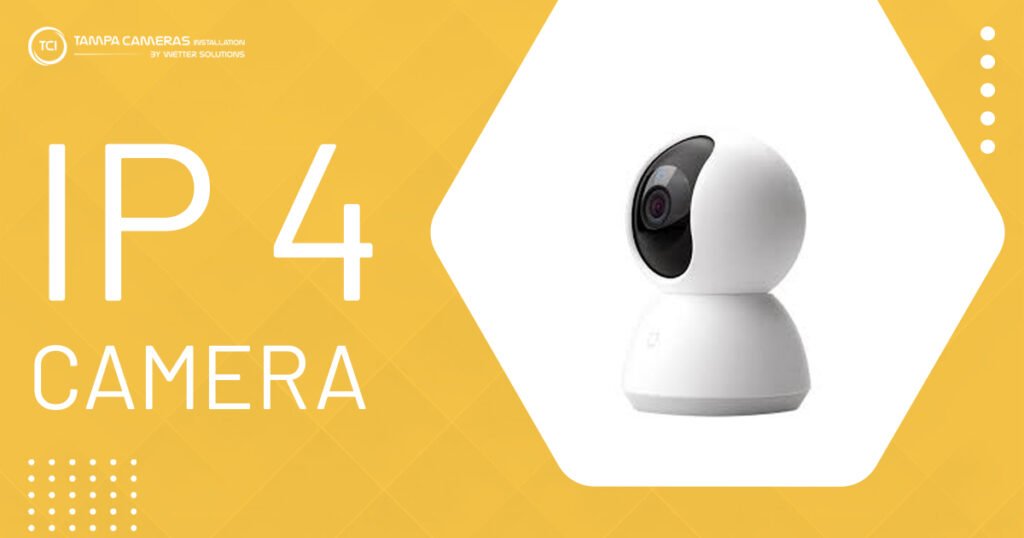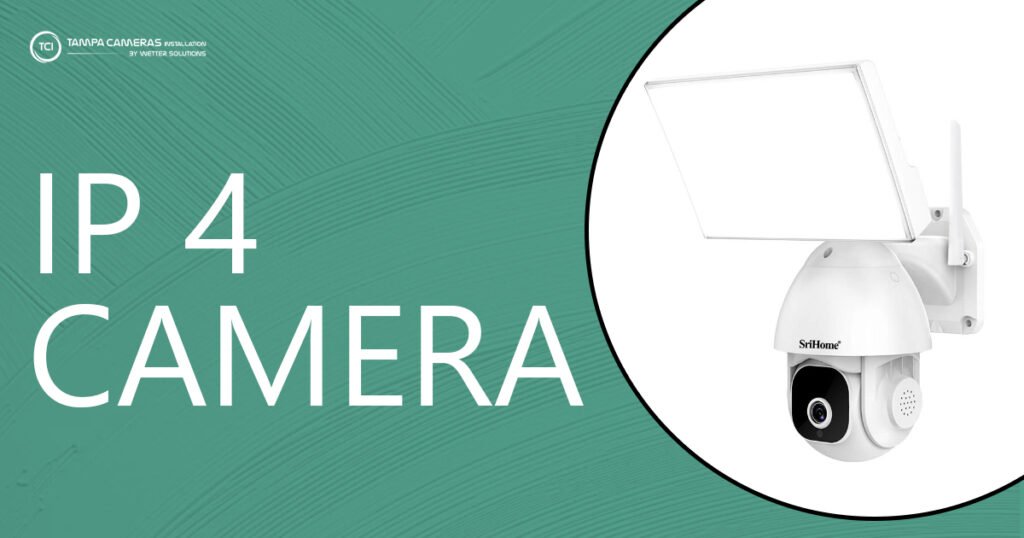An IP 4 camera, also known as an Internet Protocol camera, is a digital video camera that can connect to the internet in order to transmit video data and accept control inputs. Another name for an IP 4 camera is an Internet Protocol camera. We are able to employ IP 4 camera for projects as vast and complex as those used in corporations, as well as for projects as simple as those used in residential homes. An IP Camera is another name for a digital camera. IP stands for Internet Protocol. The primary aim for which we put these cameras to use is surveillance. In this category, you’ll find anything from webcams to surveillance cameras designed for professionals.
Your computer network is connected to the cameras by the Ethernet wire that came with them. It is possible that we will transmit the film across a computer network by utilising either an Ethernet or an internet connection. This enables real-time monitoring to take place not just via stationary surveillance desks but also via mobile devices like cell phones in addition to the more traditional setup of stationary surveillance desks.
Defining Characteristics of IP cameras
Because of the potentially severe weather that may be seen in Australia, the majority of these cameras have been hermetically sealed and are built to withstand the elements. This is a very beneficial feature, given the severity of the weather that could be experienced in Australia. Investing in one of these trustworthy cameras is a fantastic option to consider if you want to perform thorough surveillance of the areas of your house that are accessible from the outside.
If you are interested in installing IP 4 cameras to protect your personal, commercial, or not-for-profit property, then the members of our team who are educated about the procedure would be happy to answer any questions that you may have regarding the installation process. Please get in touch with us as soon as possible so that we may discuss the ways in which we might be able to assist you. If the protection of the premises of your company or organization is considered to be important enough to deserve protection, then it ought to have sufficient protection. A large number of commercial establishments rely on closed circuit television (CCTV) to monitor their properties, especially their parking lots, deter criminal behavior, and provide reliable coverage in the event that it is necessary.
IP 4 CCTV cameras
IP CCTV cameras, sometimes known as “internet-protocol” cameras, receive and store pictures through the internet instead of the digital video recorder utilised by traditional analogue CCTV systems. Even while IP 4 cameras are the most modern and versatile option for CCTV now on the market, it does not mean that an analogue approach cannot safeguard your property just as well as IP 4 cameras can. Because not all businesses will require the additional capabilities that IP 4 cameras provide, we have analysed the benefits and drawbacks of IP-based CCTV systems to assist you in deciding which solution could be suitable for your company. IP CCTV cameras come loaded with a plethora of valuable capabilities, including the following:
An advanced era of better quality
Only IP 4 cameras are capable of producing clear and unambiguous images. After being installed, IP 4 cameras allow you to remotely zoom in and focus on any finer features that were captured in the shot because their image resolution is up to 20 times higher than that of analogue cameras.
The same wire connecting an IP 4 camera to a network switch also supplies power and data transfers. The connection between the camera and the control is also made possible by this cable. Analogue cameras require the usage of two wires in order to function. Since IP 4 cameras don’t require an encoder or decoder to convert data into video and you can add as many IP 4 cameras as you like without purchasing additional network video recorders, IP 4 cameras require less equipment overall. The ability to access IP 4 cameras from a distance is another benefit.

INCREASED SECURITY
IP 4 cameras produce video material that is both encrypted and verified, giving them a more secure option than their analogue counterparts.
When connected to an open platform, IP 4 cameras can be readily integrated with a wide variety of other web-based applications. Some examples of these applications include access control and time and attendance management systems. This saves time when manually entering data into multiple applications and allows you to set IP 4 cameras to sync up with your employees’ hours spent in remote or less populated areas of your site. The scope of what is possible through a security system is greatly expanded due to this.
AVAILABLE FROM ANY LOCATION WORLDWIDE
The video streams produced by IP 4 cameras may be accessed and seen on any device that has access to the internet, provided that the user has the necessary authorization to log in to the system. This allows you to see live or recorded surveillance footage on any computer, laptop, tablet, or smartphone, regardless of where you are, and it even gives you the ability to manage the security system in the same manner remotely.
Because IP 4 cameras are connected to the internet, the video and data they take are immediately uploaded to a centralized information repository hosted on a cloud-based computer server. Because it is all saved on the cloud, there is no longer any need to keep track of dozens of cassettes or CDs containing film or even take up space on your own servers. This also ensures that you will retain your footage if a camera is lost, stolen, or broken.
DISADVANTAGES INHERENT IN THE USE OF IP 4 cameras
Among the disadvantages of IP CCTV cameras are the following:
IP 4 cameras come with a more significant price tag than their analogue counterparts due to the broader range of standard functions on IP 4 cameras. Changing from analogue cameras to IP 4 cameras might also involve a significant financial investment. Still, once a system is up and running, it is much simpler to expand or reduce its capacity as required.
Because IP 4 cameras are connected to the internet, it should be no surprise that you will want a good internet connection with sufficient bandwidth to support them.
TRANSITIONING AWAY FROM THE ANALOGUE SYSTEM
More good news: if you currently have an analogue CCTV system but are considering switching to IP 4 cameras, you can still use your existing system. Because IP 4 cameras may, in most cases, utilize the same wiring as an analogue solution, you can replace as many of your cameras as you wish at once, beginning with the ones that are the most crucial to your operation. During this interim period, it will be helpful to divide expenses by utilizing a hybrid analogue/IP CCTV system.
However, before beginning the process of replacing your cameras, you should first take the time to evaluate your security strategy to determine whether or not it still satisfies the requirements of the organization. It’s possible that you have cameras installed where they aren’t required or that parts of your site aren’t adequately covered. It is a fantastic chance to make sure that your new IP 4 cameras will establish a CCTV system that represents your current security requirements and has the potential to scale up in the future. You can take advantage of this opportunity by ensuring that your new cameras provide this potential.
In addition, We may connect Internet Protocol (IP) cameras to various Internet of Things (IoT) devices. You can connect your camera to a security system that will activate an alert if the camera detects motion. Suppose your camera has the capability of recognizing faces or license plates. In that case, you could even set this up to offer personalized greetings or restrict access to those who have a legitimate need for it.
GET STARTED RIGHT AWAY ON THE DESIGN OF YOUR IP CAMERA SYSTEM.
IP 4 cameras provide the very finest levels of CCTV security; thus, if your company is prepared to profit from everything it can achieve, get in touch with us as soon as possible.
What are the primary advantages of using IP 4 cameras?
Simple Setup Requirements
IP 4 cameras are straightforward to set up. They can get their power from something called Power over Ethernet (PoE), and they can link to one another via Ethernet connections, which means that there will be less wiring required to set up the cameras. Especially useful in locations where installation could be complicated.
In addition, you won’t require the assistance of an electrician to wire the cameras.
Less high prices
IP Additionally, cameras are much more affordable than CCTV, making them far more available to home users and smaller enterprises. The installation cost is far less than that of a complete CCTV system, which means there is less of a financial barrier to entry. No cumbersome cassettes or pricey installations are needed when setting up a single or dual camera.
The Integration of Smartphones
since cameras are frequently included in cell phones as well. This enables you to monitor the safety of your property regardless of where you are in the globe so long as you have internet access and can log in to the system. No suffering due to a restricted movement range.
Simple Setup for a Multiple Camera System
Additionally, you can connect many IP 4 cameras to your network simultaneously. In this manner, you will be protected on all fronts and have speedy access to all of the cameras at your disposal. Motion sensor technology can be added to the majority of cameras, allowing them to respond to any movement that occurs on your property, whether that movement occurs inside or outside. You only need to make one move for your smartphone to send you a notification quickly.
Compatibility with an Already Existing Network
If you already have an entire computer network, switching to IP Camera may be as simple as connecting the cameras to your current network. This is because the migration process is simplified when you already have an entire computer network. You may upload the video footage to existing servers, and you can use switches already in place.

